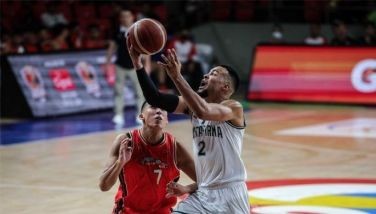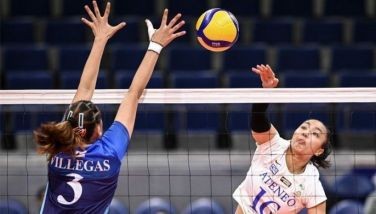Professionalizing amateurs (Part 1)
There is much confusion and debate about the blurred lines between amateur and professional athletes. One controversy revolves around national boxers Mark Barriga and Charly Suarez, who have been declared professional by the Games and Amusements Board. The GAB, through chairman Ramon Guanzon, has said that, by participating in the AIBA Pro Boxing Tournament for the succeeding five years, they now fall under the jurisdiction of the agency, which regulates all professional sports in the country. Guanzon says the participating boxers “sign contracts, receive a guaranteed purse and fight for six rounds or more” thus making them professionals.
Unfortunately, the reply of AIBA, the world body for amateur boxing itself, does little to help clear the muddy definition. In a letter to Alliance of Boxing Associations of the Philippines executive director Ed Picson, AIBA Executive Director Ho Kim made the following clarification:
“Please note that the requirement by AIBA that member organizations including National Federations remove the reference to “Amateur” has not changed the nature or the substance of the AIBA Open Boxing Competitions (“AOB”), but instead recognizes that the modern sport of boxing no longer conforms to the perception of “amateur”. In removing the reference to “amateur” we are in accordance with Olympic sports around the world. However, we continue to run all competitions in accordance with our rules...
“AIBA Pro Boxing is not comparable to the professional boxing programs which current professional boxing organizations are managing, AIBA has launched its own pro-style competition format which is only governed by AIBA with consistent and transparent rules and regulations.”
The frequent use of the contraction “pro” and even “pro-style” is what causes the confusion. One of the dictionary definitions of the noun “pro” is “professional, especially in sports.” The definition of professional is “(of a person) engaged in a specified activity as one’s main paid occupation rather than as a pastime”, in other words, someone who receives compensation (usually in the form of money) for doing a certain job. In admitting it is “providing a career path” for boxers through the APB and World Series of Boxing, AIBA has entered a different arena. It is redefining boxing, expanding the understanding to include the use of compensation.
How did all of this begin to evolve?
Other pro sports like tennis and basketball fell under the umbrella of the Olympic movement as countries started to realize that they wanted to send their best athletes to the Games, and that their best athletes were competing professionally. In 1896 when the modern Olympic movement was organized by Baron Pierre de Coubertin, there were no professional athletes. One of the earliest conflicts was recorded in the 1920’s when American athlete Jim Thorpe forfeited two Olympic gold medals because he had received a token fee to play another sport back home. Prior to the 1984 Games in Los Angeles, the medals were returned to his family, and one of his grandsons was asked to be an Olympic flag bearer.
In basketball, it was a little more complicated. A professional athlete (as several European basketball players were) could declare himself amateur every time he was to play for his national team. Since the Olympics were held in summer when almost all professional leagues weren’t playing, this was allowed. The US, which did not have this practice, realized it needed to be able to field its best, the NBA players, who were considered full-time pros. So the rules had to be changed. Thus, in 1990, basketball was declared an open sport, even though pros and college athletes had been scrimmaging against each other for years. The Philippines sent its first all-pro team to the 1990 Asian Games, and the US “Dream Team” first saw action in the Tournament of the Americas the following year.
Boxing has had a more challenging path to tread. Firstly, spectators could not identify with their favorite boxers because everyone wore the generic red or blue headgear and uniforms. There were no names or numbers, only the abbreviation of the country names. The rules were different, the gloves bigger. There were fewer knockouts, because the fights were meant to showcase skill and style in out-pointing your opponent. In fact, Mike Tyson was excluded from the US Olympic team because he had been trained to fight like a pro. Boxers who actually made the team like eventual heavyweight gold medalist Tyrell Biggs even had to wear padding around their midsections to protect them from Tyson in sparring.
With audiences becoming more accepting of more violent sports like mixed martial arts, boxing itself has been facing a stiff challenge, unless there are compelling rivalries or popular personalities like a Manny Pacquiao. So now, all international amateur competitions have gradually modified their rules to resemble professional fights. They have done away with protective headgear and the white portion of the gloves. The boxers, therefore, have had to change their styles, since it is easier to get a knockout even if you are behind. The main difference is that, in international competition, you fight every day in the eliminations.
But be that as it may, the confusion really stems from whether or not amateurs should receive financial remuneration for fighting. Strictly speaking, they are compensated in terms of board, lodging, travel and equipment, as well as allowances. Anything outside of that, however, is questionable. Traditionally, any time money is involved (save for cash prizes donated to varsity teams), you are considered professional. Secondly, new events that are not under the Olympic umbrella are more scrutinized, because the purpose for them is not as clear. This is another gray area that has yet to be clearly defined. For the most part, national teams select their own competitions, training camps and dual meets when preparing for major events like world championships, SEA Games, Asian Games and Olympic qualifiers. Any event that does not belong in any of those categories will easily be questioned.
Boxing is in a state of transition, that is clear. It no longer fits the neat box of “amateur” as AIBA itself recognizes. If there is, indeed a new definition of amateur boxing to include fighting for pay even as a member of a national team, will people buy it? And will GAB and its counterparts in other countries accept that new definition?
- Latest
- Trending































